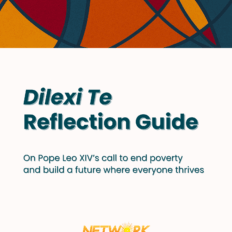NETWORK's Dilexi Te Reflection Guide
In his Apostolic Exhortation, Dilexi Te, Pope Leo XIV calls us to end poverty and build a future where everyone thrives
Pope Leo XIV named his first major teaching document Dilexi Te, which is Latin for “I have loved you.” In it, the pope calls us to reject the “empire of money” and the corrupt system that creates poverty and instead, join in loving solidarity to “honor the image of God and build a better society” (72). Pope Leo signed Dilexi Te on the feast of St. Francis of Assisi, October 4, 2025.
NETWORK's Dilexi Te Reflection Guide offers Spirit-filled justice-seekers a way to reflect on how the pope's call guides and nourishes our work for An Economy for All, and how can we can live out this call in our homes, parishes, and communities across our country.
Explore NETWORK's reflections on each chapter of Dilexi Te below and share this page with friends, family, and church groups. You can also download a PDF of the guide for easy sharing!
Dilexi Te Introduction
Pope Leo is clear: it is time to convert hearts and energies to build a society where the gifts of God’s creation are shared among all for the thriving of all.
Dilexi Te Chapter 1: A Few Essential Words
Pope Leo calls us to convert from structures and attitudes “centered on the accumulation of wealth” at all costs.
Dilexi Te Chapter 2: God Chooses the Poor
Pope Leo emphasizes that we cannot love God without loving our neighbors, and that that love requires concrete action to right wrongs.
Dilexi Te Chapter 3: A Church for the Poor
Pope Leo shows that for two thousand years, our “church of the poor” has worked to ensure food, water, housing, health care, legal rights, and more for all people.
Dilexi Te Chapter 4: A History that Continues
Pope Leo rejects worship of the marketplace and an economy that serves only the powerful, wrecks the planet, and leaves everyone else with “a few ‘drops’ that trickle down.”
Dilexi Te: Chapter 5: A Constant Challenge
The pope reminds us that Christians “cannot be limited to the private sphere” and must participate in shared public life to alleviate suffering and change unjust structures.

